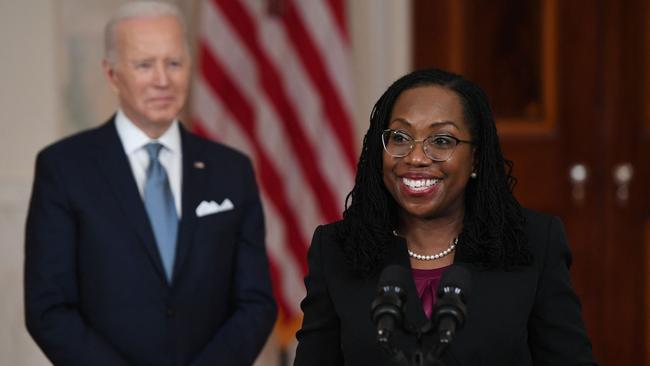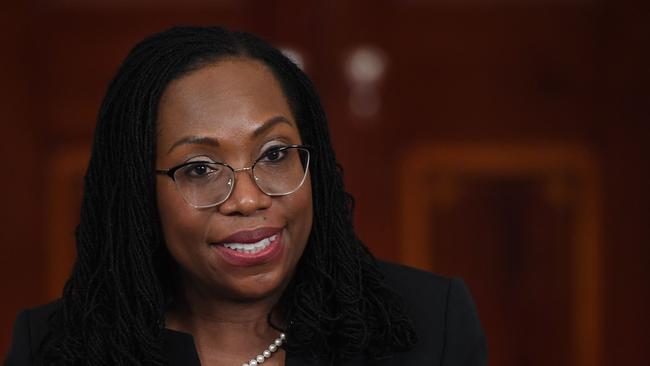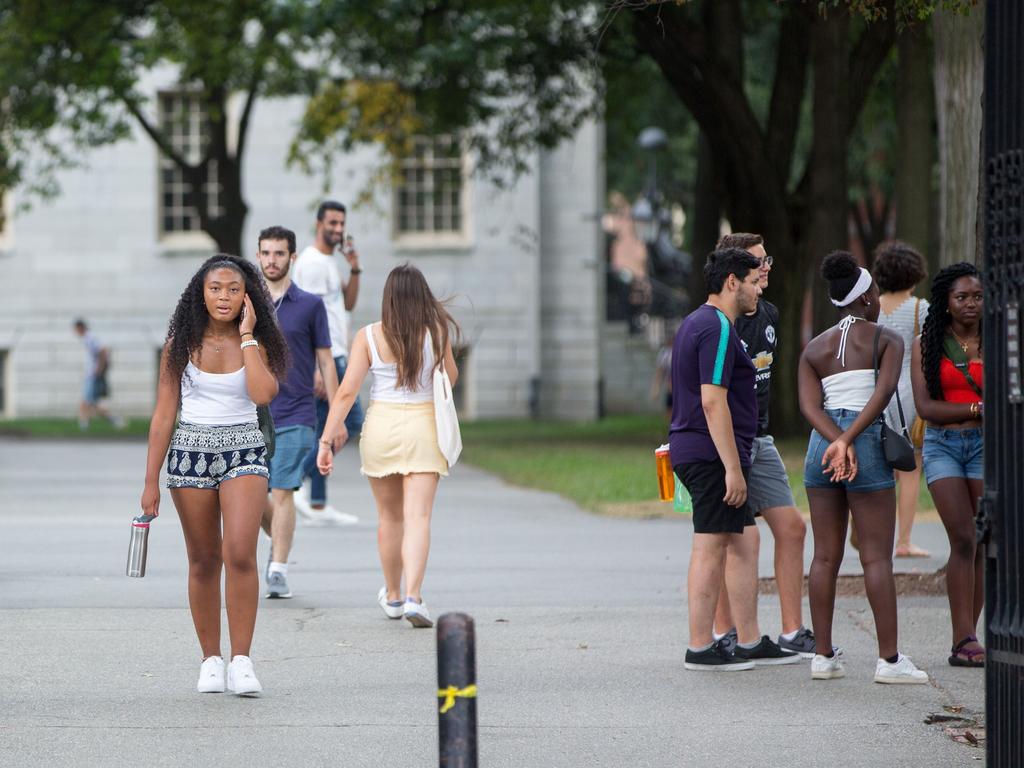Joe Biden nominates Ketanji Brown Jackson as first black woman for US Supreme Court
Ketanji Brown Jackson becomes first black woman nominated for US Supreme Court amid Republican fears of new left-wing agenda.

Joe Biden made history today (AEDT) by nominating the first black woman to the Supreme Court, Ketanji Brown Jackson, foreshadowing a showdown with Republicans in the Senate who fear the former Washington DC judge will pull America’s highest court in a radical left direction.
Following a controversial promise to pick a black woman to replace retiring supreme court justice Stephen Breyer, the president praised Ms Jackson’s brilliant career as a student, lawyer, and judge. She hails from a family of teachers and police officers in Miami, Florida.
“For too long our courts haven’t looked like America, I believe it’s time that reflects the full talents and greatness of our nation,” the president said, urging the Senate, in which Democrats do not hold a majority, to confirm her as soon as possible.
“Her parents grew up with segregation but never gave up hope that their children would enjoy the true promise of America”, noting Ms Jackson had been confirmed by the Senate three times before by Republicans and Democrats.
Ms Jackson, 51, who is married with two children, became a clerk for Mr Breyer after completing her studies at Harvard before working in private practice, as a public defender, as a member of the US Sentencing Commission and ultimately federal district court judge in Washington where she served for eight years.
“I do know one can only come this far by faith, among my very great blessings is the fact I was born in this great country, the US is greatest beacon of hope and democracy the world has ever known,” Ms Jackson said, speaking at the White House after the president introduced her.
“You may have read that I had one uncle who got caught up in the drug trade and received a life sentence. That is true, but law enforcement also runs in my family. In addition to my brother, my two uncles served decades as police officers.”
The Fraternal Order of Police, one of the nation’s largest police unions, which had previously supported Mr Trump, backed her nomination, but conservative Washington think tank the Heritage Foundation, reflecting a view among some Republicans, urged senators to block the nomination.
“Judge Ketanji Brown Jackson‘s nomination appeases left-wing special interest groups and fulfils Biden’s campaign promise of using race and sex to determine his nominee,” it tweeted.
Prominent Republican senator Lindsay Graham, who had advocated for an alternative judge from South Carolina, said the “radical Left has won President Biden over yet again”. Conservative author Ann Coulter tweeted Ms Brown was a “borderline Trotskyite”.

Ms Jackson attracted criticism from Republicans last year when she co-authored an opinion piece requiring the release of certain Trump White House documents to the Congressional January 6th Commission.
“Judge Jackson has already inspired young black women like my daughters to set their sights higher, and her confirmation will help them believe they can be anything they want to be,” said former president Barack Obama in a statement on Friday.
House Speaker Nancy Pelosi said Ms Jackson was “one of the sharpest legal minds in a generation [having] an unyielding commitment to justice and a strong voice for American values”.
Activist group Black Lives Matter tweeted she would “blaze a trail for generations of brilliant Black women to follow. We are thrilled and so, so proud!”
Former president Donald Trump appointed three justices to the Supreme court – Neil Gorsuch, Brett Kavanaugh and Amy Coney Barratt – whom Democrats vigorously opposed, argued it shifted the court in a conservative direction.
Appointing supreme court judges, who have no mandatory retirement age, is among the US president’s most consequential roles, given the role of the Supreme Court in interpreting the US constitution.
The court overturned the Biden administration’s vaccine mandate for private sector workers, and experts expect it to wind by abortion rights in a decision expected later this year.
President Reagan appointed the first woman supreme court justice, Sandra Day O’Connor in the 1980s; president Johnson appointed the first black justice, Thurgood Marshall, in the late 1960s.
Democrats, who hold 50 seats in the 100 seat Senate, could confirm Ms Jackson with Vice President Kamala Harris’s casting vote.






To join the conversation, please log in. Don't have an account? Register
Join the conversation, you are commenting as Logout